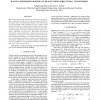Free Online Productivity Tools
i2Speak
i2Symbol
i2OCR
iTex2Img
iWeb2Print
iWeb2Shot
i2Type
iPdf2Split
iPdf2Merge
i2Bopomofo
i2Arabic
i2Style
i2Image
i2PDF
iLatex2Rtf
Sci2ools
119
click to vote
DCC
2010
IEEE
2010
IEEE
Block Compressed Sensing of Images Using Directional Transforms
Block-based random image sampling is coupled with a projectiondriven compressed-sensing recovery that encourages sparsity in the domain of directional transforms simultaneously with a smooth reconstructed image. Both contourlets as well as complex-valued dual-tree wavelets are considered for their highly directional representation, while bivariate shrinkage is adapted to their multiscale decomposition structure to provide the requisite sparsity constraint. Smoothing is achieved via a Wiener filter incorporated into iterative projected Landweber compressed-sensing recovery, yielding fast reconstruction. The proposed approach yields images with quality that matches or exceeds that produced by a popular, yet computationally expensive, technique which minimizes total variation. Additionally, reconstruction quality is substantially superior to that from several prominent pursuits-based algorithms that do not include any smoothing.
Block-based Random Image | Compressed-sensing Recovery | Computer Graphics | DCC 2010 | Requisite Sparsity Constraint |
Related Content
| Added | 17 May 2010 |
| Updated | 17 May 2010 |
| Type | Conference |
| Year | 2010 |
| Where | DCC |
| Authors | Sungkwang Mun, James E. Fowler |
Comments (0)

